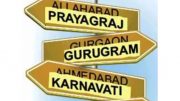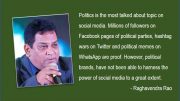In the good old days of offline political discourse, politicians had platforms to speak they received in their rallies, houses of assemblies and parliaments and the like. They said what they wanted, how and whenever they wanted to say it. Political attacks (and counterattacks) were earlier made in a unidirectional way – in political rallies, press conferences etc. If you were attacked, you had the enough time to craft a resounding reply and often had the option to ignore the attack entirely.
Then came Twitter.
On Twitter those options do not exist. Attacks are more direct, and in real time. There is a “golden window” of a Twitter “Clap back”, beyond which your retort might as well have not been made. Ignoring has deeper consequences – it can be implicit of weakness or that the attacked agrees with the assailant’s claim. Furthermore, audiences don’t have to “be” there to be a part of the conversation, which remain online forever.
The characteristic of the platform, simply put, has allowed interest groups to determine their own way of using it. Politicians and political thinkers have found their own utility for it, which serves to propagate and discuss ideas, set facts straight, question and of course retort. The nature of these conversations, in my opinion, has been SUPERCHARGED.
Twitter wars between politicians have gotten fierce. Political statements, allegations and attacks have become more research driven and fact based, far from the conventional way of doing so. Take an example of the recent spar between Karnataka CM Siddaramaiah and the leader of his opposition B. S. Yeddyurappa, who have recently been as actively engaged in spats with each other as you would expect American pop stars to be. It started in the aftermath of PM Modi’s speech in Bengaluru, with Siddaramaiah picking up one of his claims:
I am glad PM @narendramodi is talking about corruption. I now invite him to #WalktheTalk . For a start can you
1. Appoint Lok Pal
2. Investigate #JudgeLoya ‘s death
3. Investigate the astronomical rise of #Jayshah
4. Appoint an untainted person as your CM candidate ?— Siddaramaiah (@siddaramaiah) February 6, 2018
To which, Yeddyurappa gave a point by point rebuttal just two hours later
Dear Mr. #10PercentCM @siddaramaiah, I am equally glad that you have started this discussion. Before we head up North to Delhi, why don’t you answer a few questions here:
– Why did you quash all the powers of #Lokayukta and make it a toothless body? #Dare2Answer
— B.S. Yeddyurappa (@BSYBJP) February 6, 2018
(Side note: These conversations are going to be pivotal in the upcoming Karnataka Assembly Elections, which this column will discuss in the coming weeks)
This is not the only instance either. It is surprising to see the vigour and style of two septuagenarians in conversing on Twitter. A voter could also consider it refreshingly responsible and transparent. And regardless of age, constituencies etc. the skill of articulation (to be concise in under 280 characters), and a research support (to be credible and hard hitting) is paramount. A bit of wit will be an added bonus, in amplifying reach. Of course, this has also prompted political outfits to take shortcuts (Congress Social Media Head Divya Spandana Caught Promoting ‘fake accounts’) or encouraging trolling (PM Modi’s Crazy Implicit Support of Trolls).
But does the impact of such political discourse go beyond Twitter? Do they make a change happen in terms of votes or even significant change in opinion? Or are these echo chambers of a very specific group of people?
In terms of penetration, Twitter is still a platform which is catching up in India, with about 24% compared to 33% for Facebook in 2016. But arguably, its growth is significant; the number of Twitter users in India doubled to 23.5 Million between 2013 and 2016, and is projected to reach 30 Million this year. While it becomes seriously substantial, its impact “on the ground” remains debatable.
Add to it the nature of Twitter algorithm – which also feeds you back what you already agree with. At the end of every Hashtag war, Twitter warriors on all ends of the ideological spectrum declare themselves “winners”. (Why would Twitter create such an algorithm? Imagine being the casino where each player believes they won off the other players. Wouldn’t they want to keep coming back? But the House always wins).
We will deep dive into the evidence and nature of on-ground impact created by Twitter wars, and its dynamics in this column in an upcoming post, and take a look at the machinery underneath it (to see how a political communicator could wield this weapon).
How do you think Twitter is changing political conversations? Comment below or Tweet to me at @HemantGaule
Previously on State Craft:







Leave a comment